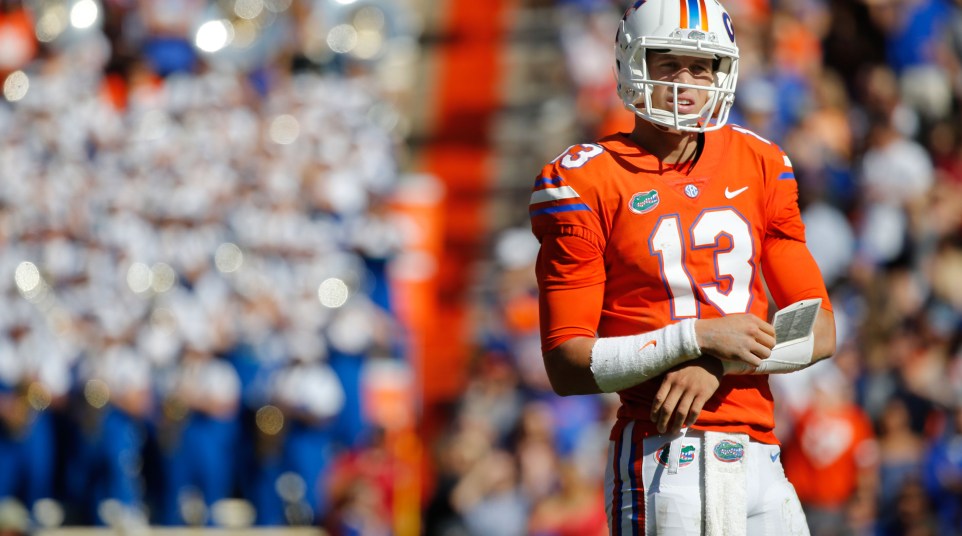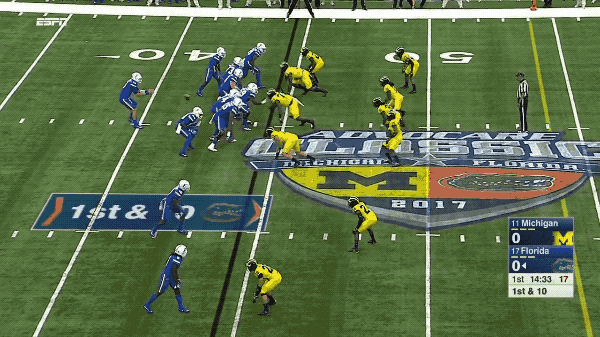
Breaking down Florida's QB battle: The case for Feleipe Franks
Florida’s fall camp began this week as it has each of the past four seasons: without a clear-cut starter at quarterback.
Call it a competition or a controversy, but whatever the nomenclature, Florida lacks answers at the quarterback position.
The inability to develop and find consistency at quarterback is a trend that spans nearly a decade. Florida has started 12 quarterbacks since Tim Tebow graduated, the most of any school in the SEC. Since 2011, they have had multiple players start at least 2 games at the position. This instability has wreaked havoc on a proud program. It’s the reason Florida’s offense hasn’t finished above 74th in S &P+ total offense since 2012 and it’s the largest reason the school parted ways with Jim McElwain late in a dismal 2017 season.
Last fall, Florida started camp with three legitimate candidates for the starting job: the well-traveled Luke Del Rio, Notre Dame graduate transfer Malik Zaire, and the very highly-touted blue-chip redshirt freshman Feleipe Franks, who has an abundance of physical tools but had not played a down against college competition.
In the end, Franks won the competition, although in keeping with the recent disturbing historical trend, all three Gators quarterbacks started at least one game. Outside of Luke Del Rio, who came off the bench to lead a memorable fourth-quarter comeback win over Kentucky and was good against Vanderbilt a week later until being injured late, none of the quarterbacks performed at even an average level.
Franks threw a gorgeous pass on an opening field goal drive against Michigan, but struggled mightily thereafter. Franks finished the season with an abysmal quarterback rating of 113.3 (second-lowest in the Power 5, just ahead of Kellen Mond) and a 5.5 adjusted yards per attempt (a popular efficiency metric for value per throw downfield), the lowest in the Power 5 (Mond was 5.6).
Outside of “The Heave to Cleave” and the above “Bambi-on-Ice” jaunt against Texas A&M, Franks was a shell of the player Florida thought they had signed when they flipped the young man out of the Florida’s panhandle from LSU in late 2015.
Franks was particularly outclassed against elite defenses. He was 7-for-19 for 30 yards with an interception in a 42-7 loss to Georgia and threw 3 interceptions, all of which led to FSU touchdowns, in a humiliating 38-22 home loss to a mediocre Florida State team to end the season.
By his own admission, Franks ended the season with his confidence shot and plenty of questions about his future at Florida given the arrival of new head coach Dan Mullen.
Franks was up and down in the spring, showcasing the rocket arm that made him such a coveted recruit and in the spring game, showing a flash or two of athleticism for those who wondered if he would be a misfit for Mullen’s run-dominant spread offense. By most accounts, Kyle Trask performed better as a whole in the spring, and Trask certainly had a better spring game.
Nevertheless, Franks entered fall camp with a chance to win the job, and took reps with the first team when the Gators opened practice this week. To date, Mullen has been less than impressed with the group, simply stating they “don’t understand” what it takes to win football games.
That needs to change fast if Florida is to succeed in 2018.
Over the next few days, SDS will take a look at each candidate for one of the most scrutinized positions in college football: starting quarterback at the University of Florida.
Here’s the case for Dan Mullen starting Feleipe Franks.
He’s the most talented arm on the roster
Franks can make all the throws. This pass, to Joshua Hammond against Michigan, is inch-perfect:

So was this one, under pressure and covering 70 yards, to Tyrie Cleveland:
Those types of throws are why it’s so hard for coaches — who sign up to be professional “fixers” — to turn away Franks, even the confidence-shot reclamation project Mullen inherits.
Does he have problems? Yes.
Notably, Franks struggles with the mental demands of playing quarterback in the Power 5. He misses blitzes at the line of scrimmage, like he did on his pick-6 against FSU last season. He fails to read progressions, forcing the ball instead of checking down for easy yardage that allows an offense to stay on schedule and live to see the next play. Perhaps worst, he often holds the ball too long as a result. Last year, that contributed to Florida’s much-maligned offensive line surrendering 37 sacks, the most for the program since 1992.
However, coaches always believe they can fix the problems the last guy couldn’t, and as a result, Franks might have too much arm talent for Mullen to turn down.
He’s more athletic than Kyle Trask and more experienced than Emory Jones
Athleticism is a big thing in Mullen’s offense, because no matter how good Florida’s running back stable is, many of Mullen’s power concepts and play-action concepts are contingent on a quarterback that can run a little.
Franks showed some flashes of athleticism last year and in the spring, and he’s faster and more physical than he looks. That could be a big edge over Trask, who is a more accurate thrower but much less mobile.
Franks can also use his physical size and athleticism to his advantage in Mullen’s system, as he tends to see the ball better down the field, as the throw here, where he looks off the safety for once and hits Tyrie Cleveland in stride downfield.

Franks also has experience.
Not all experience is the same — bad experiences can damage confidence — but at a minimum, Franks has seen live snaps in the SEC. Even if he didn’t succeed, he has played in a hostile night game road environment (Kentucky last season). He has faced elite defenses like Georgia and Florida State. He has an idea of what to expect when the lights come on.
Trask didn’t start a game in high school (he was stuck behind the uber-talented Houston QB D’Eriq King at Manvel High in Texas). Emory Jones is a true freshman, and while highly-regarded, he played at tiny Heard County High School in Georgia. The speed of live college football and the walls of sound in the SEC may impact Jones and Trask more than Franks.
Mullen’s track record with misfit toys is excellent
Forget about Chris Leak, who was a polished All-SEC type quarterback who had just led the SEC in passing when Urban Meyer and Dan Mullen took over at Florida. Yes, they deserve credit for refining their system into a hybrid that worked for Leak, but Franks is no Chris Leak.
Forger about Dak Prescott, who in addition to being a gifted dual-threat is one of the most intuitive quarterbacks to ever play in the SEC, a player who always seemed a step ahead of a defense. That’s not Franks either.
But that’s OK.
Florida just wants competency at the quarterback position, and Mullen is an expert at delivering just that, often against the odds.
Chris Relf was similar in stature to Franks, although he was an inch shorter at 6-4 and perhaps a bit more physically imposing and faster. Used primarily as a runner Mullen’s first year in Starkville, Relf became the full-time starter for Mullen in 2010 and helped guide the Bulldogs to a 9-4 season and a Gator Bowl victory, where Relf was the MVP.
He was less heralded than Franks, and Mullen simplified throws for him, moving the pocket to offer RPOs, throwing quick hitches and screens and helping build confidence. Relf eventually completed 58.6 percent of his throws his first year as a starter (not great, but well-beyond serviceable), while adding over 700 yards rushing. His quarterback rating was good for 6th in the SEC, too, at 141.0. That’s competent!
Relf returned to Earth as a senior, with 9 interceptions dropping his QB rating back to 121. Still, he completed 60 percent of his passes, and was competent enough to help Miss State win the Music City Bowl.
Franks is a better downfield thrower than Relf and always will be. He’s also not going to run for 700 yards. But Relf is a terrific example of Mullen coaxing the most productivity out of a player whom most had written off as incapable of performing at a high-level.
If Florida can coax a Relf-like season of productivity from Franks, they should be in a position to succeed in year one under Dan Mullen, especially given the reality that Franks has a better supporting cast around him than Relf, Mullen and Miss State had in 2010.
